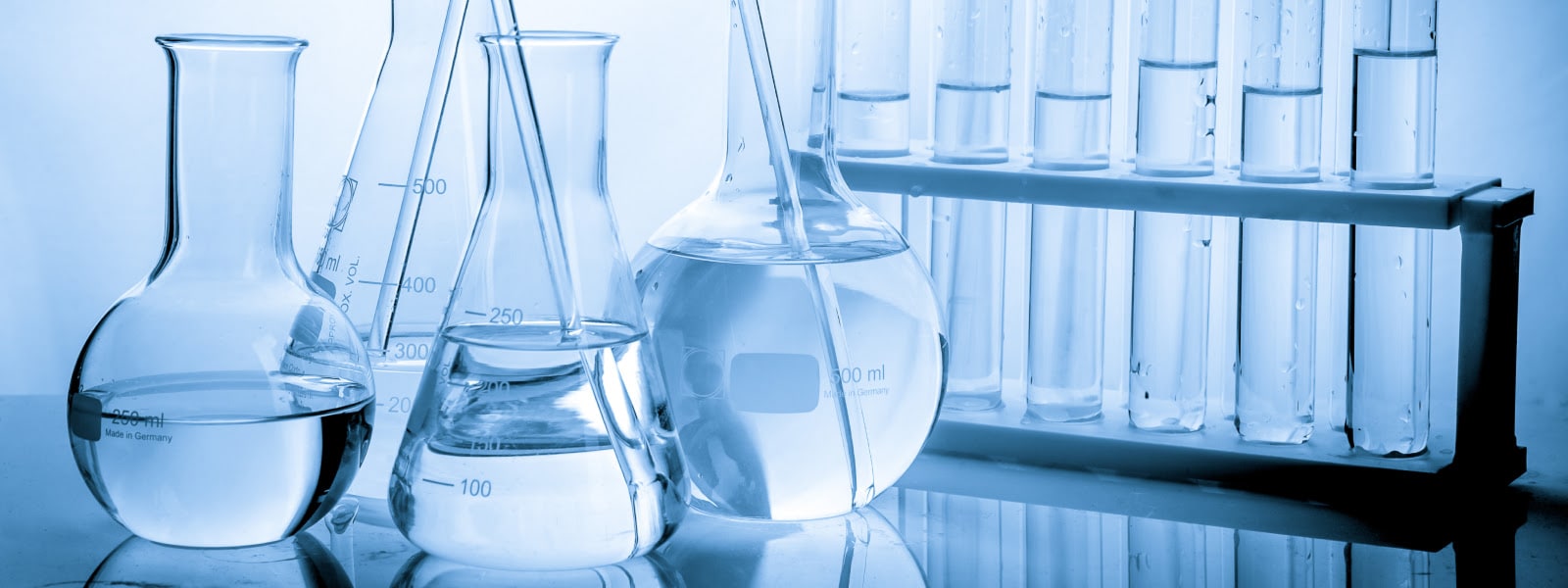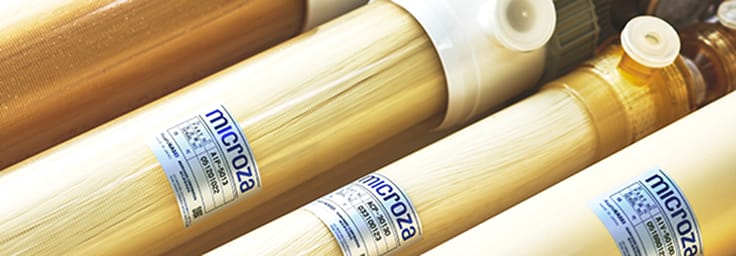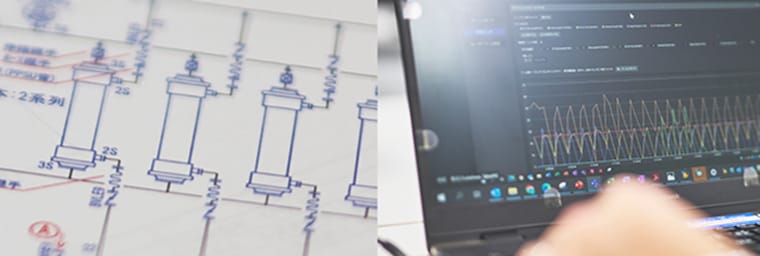Higher Purity, Greater Efficiency
In advanced chemical industries requiring removal of particles at the nanometer scale, Microza® hollow fiber membranes offer high separation performance that reliably removes even fine impurities, along with easy scalability. They address challenges such as space-saving, reduced manual labor, and stable separation precision—difficult to achieve with conventional centrifugation or filter presses—contributing to improved productivity and quality in the chemical industry.
High-Precision Separation with Microza® Beyond Conventional Methods
When handling chemical materials that are becoming increasingly fine and pure, many companies face challenges such as insufficient filtration precision with existing separation systems and the need for efficient desalting and purification systems. Technologies such as gravity separation (sedimentation, centrifugation) and filter presses cannot completely remove by-products or unreacted substances that have been miniaturized to the nanometer scale. As a result, fine particles such as contaminant ions, complex ions, monomers, and additives in slurries or emulsions requiring miniaturization tend to remain, hindering improvements in product purity and recovery rates.
Microza® UF and MF membranes address these challenges by providing high separation precision capable of removing particles down to the nanometer scale, along with stable filtration performance. Crossflow filtration using hollow fiber membranes enables efficient removal of by-products and unreacted substances from highly refined chemical materials in both R&D and mass production, supporting the achievement of higher product purity.
-
Features of Microza® UF Membrane ModulesUnlike typical hollow fiber UF membranes with single-skin structures, Microza® UF membranes adopt a double-skin structure with separation functions on both the inner and outer surfaces. This design reduces the risk of leakage, as the outer surface compensates when the inner surface is subjected to load in purification and concentration processes.
Learn More About Microza® UF Membranes -
Features of Microza® MF Membrane ModulesMade with PVDF (polyvinylidene fluoride) membranes using the proprietary TIPS (Thermally Induced Phase Separation) method, Microza® MF membranes offer superior chemical resistance and durability compared to PVDF membranes manufactured with the conventional NIPS (Non-solvent Induced Phase Separation) method. These membranes maintain stable filtration performance even under repeated cleaning with oxidizing chemical slurries or agents, with a low risk of leakage. For chemical industry applications, Microza® offers a 1.4 mm φ type for purifying and concentrating micron-order slurries and emulsions, and a 2.6 mm φ type for high-concentration processes, meeting diverse needs.
Learn More About Microza® MF Membranes
Integrated Purification and Concentration, Improved Productivity with Continuous Processing
Concentration of inorganic colloid slurries has generally required the use of multiple devices for purification and concentration.
By introducing Microza® crossflow filtration systems, both purification and concentration can be completed using a single filtration unit. This not only results in a more compact system configuration, but also enables simplified production processes and reduced initial costs.
Furthermore, transitioning from batch to continuous processing reduces resource losses associated with batch operations and improves productivity.
Achieve Unprecedented Scalability
In the research and development stage, centrifuges are commonly used for concentrating inorganic colloid slurries and organic emulsions. However, scaling up centrifuges often presents challenges such as high equipment costs, securing installation space, and concerns about safe operation.
For those who wish to design experiments with future mass production in mind from the early stages of R&D, adopting a crossflow filtration system enables easy scaling from beaker-scale to pilot equipment and ultimately to commercial-scale systems.
Microza® meets exactly these needs. With Microza®, the separation and concentration performance of UF and MF membranes can be verified from the early stages using pencil-type modules with small samples, and scaling to full production simply involves increasing the number of membrane modules.
-
Test Modules Operable at Beaker ScaleThese are pencil-type hollow fiber membrane modules for testing, allowing separation performance to be checked with small samples before full-scale implementation. They are available in both UF (ultrafiltration) and MF (microfiltration) grades and can be easily tested using a handheld pump. Learn More About Test Module Membranes
-
Customizable Membrane Filtration Equipment for Production ScaleThe number of membrane modules can be flexibly set, enabling smooth transition from research and development to mass production. With Microza®, services are available for designing and manufacturing equipment from scratch to meet customer needs, accurately accommodating various requirements such as application, installation environment, and operability. Learn More About Custom-Made Equipment
Space-Saving Compared to Centrifuges and Ceramic Membrane Methods
Centrifuges are commonly used for concentrating inorganic colloid slurries, but as they increase in size, high-speed rotation leads to noise, vibration, and the need for safety measures, as well as occupying significant installation space. Methods using ceramic membranes also tend to require large circulation pumps, resulting in larger equipment.
With Microza® hollow fiber membranes, it is possible to reduce equipment footprint compared to centrifuges and ceramic membrane systems.
Reduced Manual Labor and Dust Dispersion, Improved Work Environment
Conventional filtration equipment often presents challenges such as dust dispersion from scraping, noise, and disassembly of rotating parts, increasing operator workload and safety risks. Filter presses, candle filters, and gravity separation require scraping and washing to recover slurry, which can lead to dust issues with dried slurry. Centrifuges also pose risks from rotating parts, noise, and require regular disassembly, placing additional burdens on the work environment.
Microza® filtration systems eliminate these issues. With Microza®, purification and concentration processes are completed entirely within tanks and piping, enabling labor savings and significant improvement in the working environment. There is no noise or risk from rotating parts, and frequent disassembly of equipment is unnecessary. Compared to filter presses, scraping operations are not required. Combined with a spray dryer, uniform powder particles can be obtained, eliminating the need for regrinding processes required after using a press filter.







